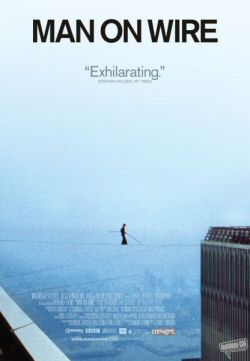
MAN ON WIRE
UK, 2007, 94 minutes, Colour/Black and white.
Directed by James Marsh.
A fascinating film about a fascinating (if self-publicising, idiosyncratic) celebrity. While it is a documentary, it has some reconstructed sequences and plays as interestingly as a fiction feature.
Philippe Petit was a 23 year old Frenchman who walked on wires between the two towers of the World Trade Center on August 7th 1974. At the same time, Richard Nixon was making speeches about Watergate and, the day after the walk, resigned the presidency losing some of the headlines to M. Petit.
Documentarist James Marsh (who also made the feature film, The King, with Gael Garcia Bernal) has had access to a great deal of film footage and photographs of Petit’s walks, not only in New York, but also between the towers of Notre Dame Cathedral in Paris in 1971 and between two pylons on Sydney Harbour Bridge in 1973. The framework of this film, however, is the narrative of preparations for the World Trade Center walk, an attempt cut short, the night before the walk with its tensions in getting into the building, carrying the equipment, hiding from security staff, firing the arrow which would take the cable from one tower to the other.
Most of the principal members of the team have been interviewed for this film intercut with the archival footage showing them over thirty years earlier (looking particularly 70s-ish with hair styles and clothes), part of the fascination. In the reconstructed sequences, we see Philippe’s early days in France, his developing his tightrope walking skills. And Petit himself, in his late fifties, is a vigorous and entertaining raconteur, drawing us into his story and his vision and his feelings. He just doesn’t tell the story but gets up and re-enacts a lot of what he did.
Petit’s skills, nerve and acrobatic skills are often beautiful – the testimony also of one of the NYPD who was on hand to arrest him.
A continually gripping and intriguing documentary – sometimes unnerving if one has empathetic vertigo sensitivities as one sits in one’s comfortable seat looking at Petit way up high.
1.The appeal of the film, the personality of Philippe Petit, his feat, his skills, the danger and the daring?
2.Philippe Petit as a young child, the photos and glimpses, his goals, his training in the carnival, the dentist’s chair and the article about the Twin Towers, the Twin Towers and the stirring of a vocation, the sequences of his training, with his friends, Jean- Louis, Jean- Francois, Anne? The showing of the walk from the towers of Notre Dame? The walk on the wire between the pylons of Sydney Harbour Bridge? Marc and his help? New York and the team for the walk?
3.The framework of the documentary in showing the arrival in the United States, the entry into the building, the preparations, the attempt being cut short, the night in the building, hiding from the security guards, luck in being able to take the equipment up higher, the firing of the arrow, the pulling of the cable, getting ready? The members of the team opting out? The success of the walk?
4.The visuals of the walking, the policeman referring to it as a dance? Acrobatic skills? Forty-five minutes between the towers in the World Trade Centre? The crowds watching? The reactions of the police?
5.The archival footage, the film clips, from 1974, the range of photos? The interviewees and how they appeared when younger?
6.The interviewees: Jean- Louis, Jean- Francois, Anne, Marc, Don, Albert, Barry, Jim Moore? Their contributions to the teamwork, to the drama? The aftermath and the breaking of contact with Philippe?
7.Philippe Petit as a personality, in his late fifties, telling the story, reliving it, his enthusiasm, his re-enacting his actions?
8.Philippe as a driving force, his talent, rebellious nature, attitudes towards breaking the law – but not doing anything mean? His performance, play?
9.The walking, the balance, the skills, sitting, lying down, looking down? Smiling?
10.The aftermath of the walk, the woman in the crowd, his sexual behaviour? The consequences for Anne and the others?
11.The breaking of the friendships, yet the group remembering with great emotion, enthusiasm, sense of achievement? Regrets?
12.The putting together of all this material for a satisfying documentary with historical re-enactments giving a flavour of the times (and the resignation of Richard Nixon), the dangers, the activities and risks by young men?